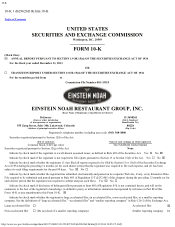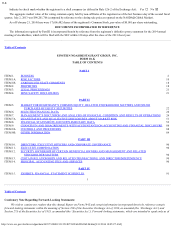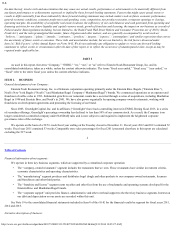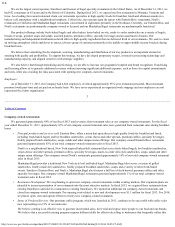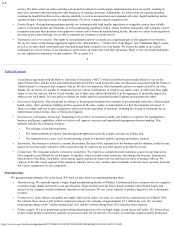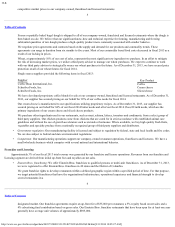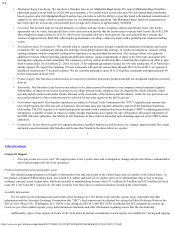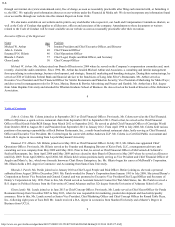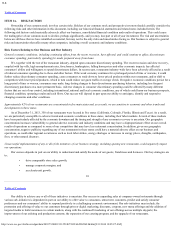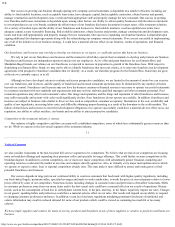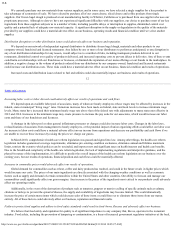Einstein Bros 2013 Annual Report Download - page 7
Download and view the complete annual report
Please find page 7 of the 2013 Einstein Bros annual report below. You can navigate through the pages in the report by either clicking on the pages listed below, or by using the keyword search tool below to find specific information within the annual report.
10-K
http://www.sec.gov/Archives/edgar/data/949373/000119312514073832/d629623d10k.htm[9/11/2014 10:05:27 AM]
•Manhattan Bagel franchising: We also have a franchise base in our Manhattan Bagel brand. The typical Manhattan Bagel franchise
agreement requires an up-front fee of $25,000 per restaurant, a 5% royalty based on net sales and a 4% advertising fund contribution
based on gross sales. Our Manhattan Bagel franchise base provides us with the ability to grow this brand with minimal commitment of
capital by us, and creates a built-in customer base for our manufacturing operations. Our Manhattan Bagel franchise restaurants that
have been open for at least one year generally have average unit volumes of approximately $580,000.
• Licensing: Our licensed units are located primarily in colleges and universities, hospitals, airports and military bases. Our license
agreements vary by venue, but typically have a five-year term and provide that the licensee pays us an up-front license fee of $12,500
and a weighted average royalty fee of 6.5%. Our license restaurants that have been open for one year generally have average unit
volumes of approximately $460,000, reflecting the predominance of college campus locations with a profitable but condensed selling
season.
• Development plans for expansion: We currently plan to expand our presence through a significant expansion of franchise and license
restaurants. We are continuously signing new franchise development agreements and may, in certain circumstances, consider selling
existing company-owned restaurants to prospective franchisees in targeted markets and cities. This strategy allows us to generate
additional revenues without incurring significant additional expense, capital commitments or many of the other risks associated with
opening new company-owned restaurants. We continue to actively market the Einstein Bros. brand franchise rights in an effort to sign
multi-location deals. As of February 21, 2014, we have 27 development agreements in place for 186 total restaurants, 47 of which have
already opened. We expect the remaining 139 new restaurants will open on various dates through 2021. In fiscal 2013, we opened 14
franchised locations and 37 licensed locations. We are currently planning to open 20 to 25 franchise restaurants and approximately 40
license restaurants in fiscal 2013.
• Product supply: Our franchisees and licensees are required to purchase proprietary products through our designated suppliers or directly
from us.
• Seasonality: Our franchisees and licensees are subject to the same seasonal fluctuations as our company-owned restaurant segment.
Additionally, as many of our license locations are on college and university campuses, they are impacted by school schedules which
typically include summer and winter breaks. Because of the seasonality of the business and the industry, results for any quarter are not
necessarily indicative of the results that may be achieved for any other quarter or the full fiscal year.
• Government regulation: Our franchise operations are subject to Federal Trade Commission (the “FTC”) regulation and various state
laws which regulate the offer and sale of franchises. Several state laws also regulate substantive aspects of the franchisor/franchisee
relationship. The FTC requires us to furnish prospective operators with a franchise disclosure document (“FDD”) containing prescribed
information. A number of states in which we might consider franchising also regulate the sale of franchises and require registration of
the FDD with state authorities. Our ability to sell franchises in those states is dependent upon obtaining approval of our FDD by those
authorities.
• Competition: In our efforts to grow this segment and attract qualified franchisees and licensees, we compete against similar fast-casual
and quick-casual restaurants that franchise and license their brands in the states where we operate.
7
Table of Contents
Corporate Support
• Principal products/services sold: The support center is not a profit center and is designed to manage and provide finance, administrative
and overhead support for all of our operations.
Financial information about geographic areas:
Our manufacturing operations sell bagels to third parties who take possession in the United States and sell outside of the United States. As
the product is shipped FOB domestic dock, invoiced in U.S. dollars and paid in U.S. dollars, there are no international risks of loss or foreign
exchange currency issues. Export sales, which are included in manufacturing revenue, were $7.1 million, $9.4 million and $10.4 million for fiscal
years 2011, 2012 and 2013, respectively. All other revenues were from sales to external customers located in the United States.
Available Information:
We are subject to the informational requirements of the Exchange Act. We therefore file periodic reports, proxy statements and other
information with the Securities Exchange Commission (the “SEC”). Such reports may be obtained by visiting the Public Reference Room of the
SEC at 100 F Street, N.E., Washington, D.C. 20549, or by calling the SEC at 1-800-SEC-0330. In addition, the SEC maintains an internet site
(www.sec.gov) that contains reports, proxy and information statements and other information regarding issuers that file electronically.
Additionally, copies of our reports on Forms 10-K, 10-Q and 8-K and any amendments to such reports are available for viewing and copying

